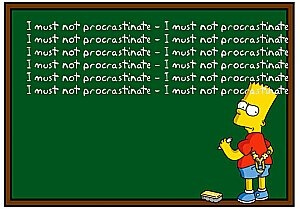Research is beginning to show that procrastination and the college lifestyle may not go hand in hand, contrary to what most students say about their work patterns.
Work done by Dr. Joseph Ferarri, a professor of psychology at DePaul University, has shown that while students may academically procrastinate, four out of five are not true, chronic procrastinators.
“There [are] 20% of men and women who [procrastinate] not only at school, but in home, at work… they don’t pay their bills on time, they miss parties and events, they don’t go to the doctor’s. If you’re this kind of person, going to time management [will not work.] You need cognitive behavior therapy,” said Dr. Ferrari.
College students that fall into the 70-75% who do not need therapy to overcome the obstacles and fears that cause procrastinating in most aspects of life, tend to be academic procrastinators.
“Whenever I’m forced to do something I'm not passionate about, I usually try to ignore it for as long as possible and have to rush to finish it last minute. My prioritizing if often off,” said Adam Green., a junior at Brown University.
Dr. Ferrari said that academic procrastination is not the same as chronic procrastination because you only do it in one setting.
Many students will attest to the fact that when homework calls, Facebook calls louder. While many students will say that technology is time wasting, research shows it does not necessarily cause procrastination.
“There has always been tech; its not tech that is the problem, its how we use it! Stop the excuse making,” said Dr. Ferrari.
While many students say they have procrastination issues, others cite time management as the factor that inhibits productivity.
Julia Scatliff O’Grady, author of the book “Good Busy,” agrees.
“We live in a society that is really benefited by an efficient discourse that makes people feel guilty with their time. [I] Hope… that we can still really be productive but not feel perpetually upset about our performance,” said O’Grady.
O’Grady believes that there are alternative methods to thinking about time and work that can benefit students to help ease academic procrastination.
“Our culture is really built around getting up and drinking coffee and being there at 9- but that’s not how it is at most university campuses; if you are better at midnight- that’s just who you are. Just really embrace it,” said O’Grady.
In her book, O’Grady outlines ten ways to re-imagine time to better avoid academic procrastination. While these skills may help the 70-75% of adults who are not chronic procrastinators, the 20% who are true chronic procrastinators need to seek a doctor for help.
“I think what happens is we have a hard time imaging time. How much space in your life do you have instead, and what do you think of that space [as]… what you can hold, makes more sense,” O'Grady said.
Image: Education Wizard



















